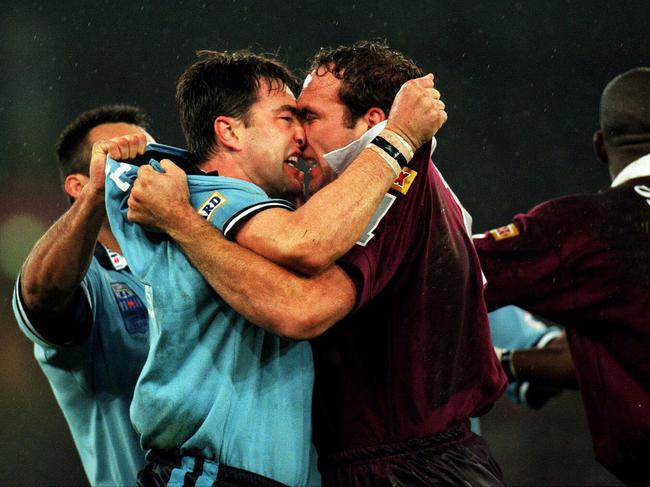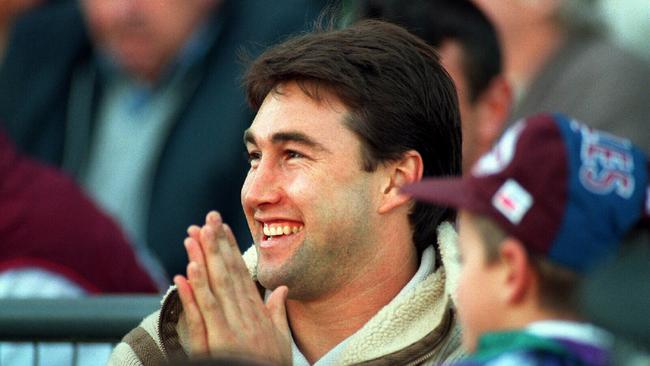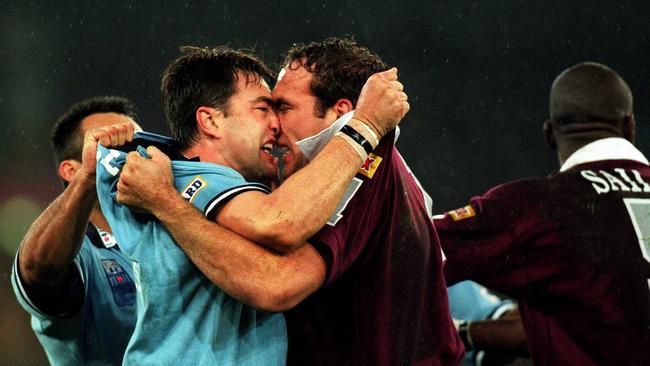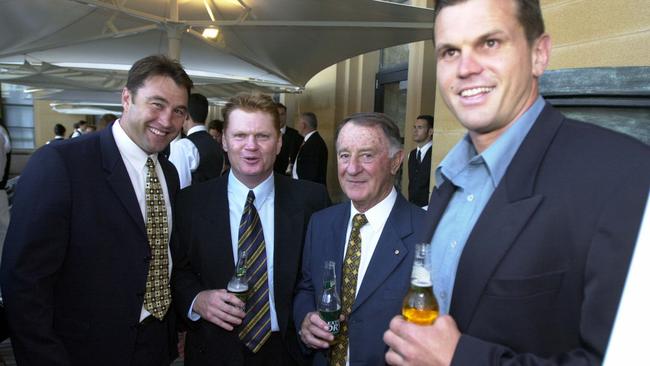Vale Terry Hill: The larrikin who changed the NRL and rugby league forever
Terry Hill may have been known as a larrikin footballer with immense talent and a quick lip, but what he will be remembered as, is a man that changed rugby league forever, writes DAVID RICCIO.

Terry Hill meant something different to everyone.
To thousands of TV viewers every Thursday night he was the funny guy with the lisp, who appeared in Lowes commercials and told us to scream ‘Go’ for a greyhound called ‘Nads’ on The Footy Show.
“Let’s now go to Dapto dogs ... over to you Tezza,’’ host Paul ‘Fatty’ Vautin would say.
For tragic Rabbitohs fans, Hill was their local junior.
But he was also a seriously good footballer — one who would shape the game as a teenager when he challenged the draft system and won.
He may have traversed through Sydney by playing for Eastern Suburbs, Western Suburbs, Manly and Wests Tigers, but to Bunnies fans, he was always the Zetland Magpie, who in his first grade debut scored the only try for a South Sydney side that included strike-players Phil Blake, Craig Coleman, Darrell Trindall, Scott Wilson and Graham Lyons.

Hill was the poster on your wall at State of Origin time in 1999.
Hill’s famous nose-to-nose stand-off with Queensland legend Gorden Tallis, one of the greatest photos ever captured.
“Terry Hill roughed up one of my players and as you do, I just grabbed him to protect my players,’’ Tallis has said famously.
“That photo is a split-second moment. We weren’t standing there for five minutes, we just grabbed each other for a moment and the greatest photo was taken.
“It’s not up in my house though, because Terry is in it.’’

To rugby league Immortal and former Sea Eagles coach Bob Fulton, Hill was a magnet to attract better players to Manly in the early 1990s.
“I went to Manly (in 1993) to win a comp,’’ former Test prop Mark Carroll says.
“I couldn’t believe the time Bob Fulton rang me at home at 10 o’clock at night and dad said, ‘it’s Bob Fulton’.
“I said, ‘You’ve got to be cracking jokes’. He goes, ‘I want you here at Manly son’. I said, ‘Who are you signing?’ He said, ‘I’ve signed David Gillespie and Terry Hill’.
“I said, ‘Where do I sign?’ Then we won a comp.’’
To his rivals, Hill was a constant torment on the field and a nightmare for opposition coach’s to game-plan against.
At centre, he used his rapid-fire lip to sledge the opposition, quite often at the exact moment he was using the brute force of his 105kg frame to push, shove and sprint around the clutching defence.
“It went on for 80 minutes, Terry didn’t stop talking,’’ Manly legend Steve Menzies said yesterday.
Hill played a total of 246 NRL games and had a strike-rate of scoring a try every two-and-a-half games.
He was a both popular and polarising larrikin who once or twice, overstepped the mark, making headlines in 2005 when he and his former teammate Scott Fulton were fined $2500 for illegally trapping lobsters.
Forever by Hill’s side and that of his son’s, Manly coach Fulton left the courtroom and spoke only to make the wisecrack: “I’m going to go home and listen to the B52s”, in reference to the band’s 1978 hit song Rock Lobster.
But perhaps Hill’s greatest legacy is not his schtick, his sledging, his Origin folklore or his eight tries in nine appearances for Australia.
It’s that Hill famously, and successfully, fought against the introduction of a rugby league draft in 1991 after wanting to play for Western Suburbs, but being forced to play for Easts.
It’s Hill’s stance, that when the annual debate of an NRL draft system erupts, it’s just as quickly shot down.
Every player today is indebted to Hill’s courage.

At age 19, he took the NSW Rugby League to court after refusing to go to Easts when drafted by the Roosters in the second league-wide draft in 1992.
As the face of the case, Hill and 126 other plaintiffs successfully won in the High Court, arguing the draft was a restraint of trade.
The High Court found that the proposed draft was an interference with a player’s right to negotiate and navigate their own futures.
Hill may be the larrikin footballer, who had immense talent, and a quick lip, but what he will also be remembered as, is the man that changed rugby league forever.




To join the conversation, please log in. Don't have an account? Register
Join the conversation, you are commenting as Logout